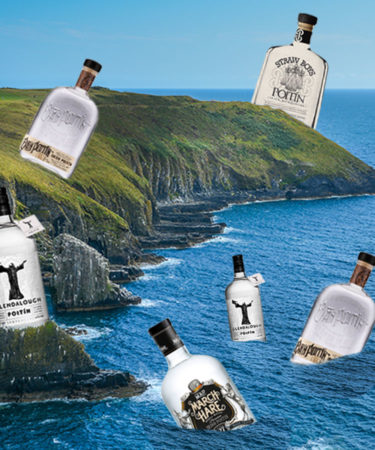
On March 6, 2019, Ireland’s biggest whiskey producers poured their wares at the Consulate General of Ireland in New York. Organizers included the Distilled Spirits Council and Irish Whiskey Association, and distillers from Jameson to Tullamore D.E.W. offered a dizzying array of Irish whiskey.
Among the craft spirits from new and heritage labels stood one outlier: Straw Boys Poitín, an Irish moonshine. Poitín, an ancient Irish spirit, is experiencing something of a renaissance in Ireland and the U.K. It’s starting to catch on in the U.S., too.
“This once-illicit spirit is capturing the imagination of bartenders both in Ireland and across the world,” David Stapleton, managing director of Connacht Whiskey, Straw Boys’ producer, tells VinePair. From Dublin distilleries, to London pubs, to a bar in Houston, Texas, Poitín is making a high-proof splash.
Poitín, Explained
Poitín is pronounced puh-cheen, not to be confused with poutine, the French-Canadian gravy-and-cheese-curd-soaked fries, or Pusheen, the curvy cartoon cat. Like America’s “white dog,” it’s an unaged, high-proof precursor to whiskey. It typically hovers around 90 proof (45 percent ABV) or more, with traditional poitín reaching as high as 180 proof (90 percent ABV). By regulation, it must be at least 40 percent ABV.
Poitín’s flavor is dependent on its sugar source. “The mash bill for this spirit was a function of the grains and cereals available in each region,” Stapleton says. These historically included barley, corn, potatoes, and sugar beets. Straw Boy Poitín is made with malted barley from County Wexford in the South East of Ireland, which Stapleton says imparts subtle fruity and floral notes on the nose, “with a hint of earthy spice tones.”
Poitíns can be sweet, herbal, or bready. The range makes it a great addition to cocktails, as a replacement for clear spirits like vodka or gin, or “whiskey-type cocktails [that] would include bitters, a citrus element, and/or vermouth,” Stapleton says. It’s also “a perfect substitute for whiskey in an Irish coffee!”
Poitin’s regional significance, along with its versatility, earned it the nickname “the mezcal of Ireland,” Stapleton says.
Legendary, Illicit, Irreverent
The history of poitín “is relatively unknown outside Ireland,” Stapleton tells VinePair. It was “a spirit of the land,” traditionally distilled illicitly in small pot stills across Ireland. Its name translates to “small pot.”
Several sources credit poitín’s invention to Christian monks in 6th-century Ireland, who learned the craft from the Middle East. Although drinking alcohol is forbidden in Islam, whiskey’s many origin stories include one theory that traveling Irish monks brought the practice back to Ireland from Arabia around 600 A.D. Another theory says distillation was invented around the year 800 by the Iranian “Father of Chemistry,” Jabir ibn Hayyan. And yet another says Vikings brought whisky to Scotland in 400 A.D., having learned the trade from Syrians. No theory is absolute.
In 1661, King Charles II outlawed poitín because Irish distillers were evading British taxes. Its ban wasn’t lifted until 1997.
Of course, poitín didn’t disappear entirely. Its illegality only made the spirit even more essential to Irish culture. “It was a way for the Irish people to express their irreverence towards the colonial British Empire,” Pádraic Ó Griallais, founder and director at Micil Distillery, told Wine Enthusiast last year.
Rural distillers continued making poitín in secret, and by the 1800s, the spirit made its way to the U.S. It gained notoriety in New York City’s “Irish towns” and was even featured in The New York Times in 1894.
Modern Moonshine Revival
Since its 300-year ban was lifted, poitín has experienced a quiet revival in Ireland and abroad. In 2008, it was given Geographical Indication (GI) status by the E.U. In 2015, the Irish government’s Irish Whiskey Technical File established rules regarding poitín’s production methods.
In 2012, Dave Mulligan founded Ban Poitín, a 48-percent-ABV poitín made from potatoes, malted barley, and sugar beet, produced at the Echlinville Distillery in Northern Ireland. It’s stocked at high-end bars, including his own speakeasy-style pub, Shebeen, in London.
Glendalough, Ireland’s first craft distillery, launched its first Poitín in 2013. Today, Glendalough’s poitín range includes a 55-percent-ABV Mountain Strength Poitín, made using malted barley and triple-distilled in a traditional copper pot still. It also produces Glendalough Sherry Cask Finish Poitín, and Glendalough Premium Poitín.
In 2015, Teeling Irish Whiskey was the first distillery to open in Dublin in over 125 years, according to the company. Its first release was its Spirit of Dublin Irish Poitín, a 52.5-percent-ABV, triple-distilled poitín made with unmalted and malted Irish barley.
Micil, Connacht, and Mad March Hare all launched award-winning poitíns in 2016. Straw Boys Poitín was a double gold medal winner at the 2017 American Distilling Institute Awards, and was named Best Irish Poitín at the 2018 Irish Whiskey Awards.
Now, poitín is even in Texas. In May 2018, Poitín Bar and Kitchen opened in Houston with an emphasis on Irish cocktails and southern U.S. cuisine. Its drinks menu includes several poitín concoctions.
